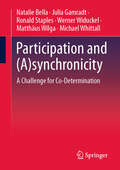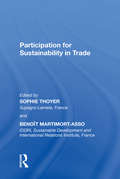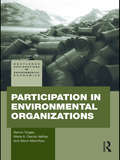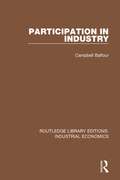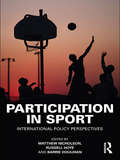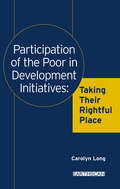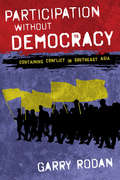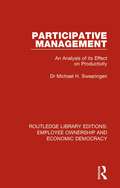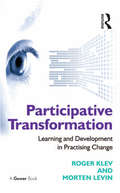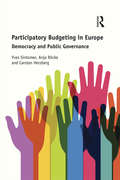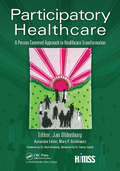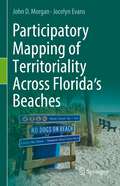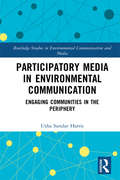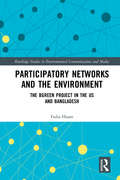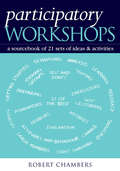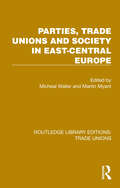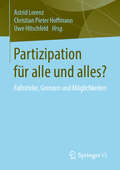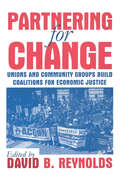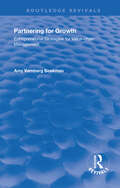- Table View
- List View
Participation and (A)synchronicity: A Challenge for Co-Determination
by Ronald Staples Werner Widuckel Michael Whittall Natalie Bella Julia Gamradt Matthäus WilgaThe book addresses digital transformation in companies and examines the changes for workplace stakeholders. The focus is on how co-determination interacts with digital transformation. This also puts a transformation of co-determination itself on the agenda, during which the direct participation of employees expands significantly in the interest-political positioning of works councils. Moreover, participation becomes a strategic resource for co-determination.
Participation for Sustainability in Trade (Global Environmental Governance Ser.)
by Benoît Martimort-Asso Sophie ThoyerPresenting extensive new research, this ground-breaking study addresses the critical dimensions of participatory and democratic processes in the field of trade-sustainability relationships and sustainability assessments of trade rules. The specific issues in trade include social and environmental concerns for which there is a wide disparity of preferences and no economic benchmark. The contributors provide analytical responses to questions of how deliberative processes can adequately close the democratic gap in global governance and how institutional reforms can ensure better access to information, transparency, deliberation and more accountability. The book provides the necessary theoretical background as well as case studies to understand these issues and is suitable for students and academics in international law, international relations and economics.
Participation in Environmental Organizations (Routledge Explorations In Environmental Economics Ser. #26)
by Benno Torgler Maria A. Garcia-Valiñas Alison MacintyreFor decades, social scientists have searched for factors that shape pro-environmentalbehaviour. However, only a few studies have investigated the causes andconsequences of participation in environmental organizations. This book fills the gap by analysing in detail the determinants of environmental participation and its consequences in different parts of the world. Benno Torgler, María A. García-Valinas and Alison Macintyre seek the answer to several questions regarding who is working towards positive outcomes for our environment, what sort of social and institutional context will assist voluntary participation, what sort of attitudes are related to positive environmental behavior, and which countries are active on the intergovernmental stage. By focusing on voluntary participation in environmental organizations, we are able to determine the level of willingness to work towards a solution for environmental problems. This allows an insight into the motivations and attitudes of individuals and nations and how these factors can affect environmental cooperation. Participation in Environmental Organizations sheds light on who is liable to participate and will help to see whose priorities and values are forwarded through voluntary activities and to what extent voluntary participation can become representative. Thus, the book provides a unique examination of citizens’ willingness to participate in environmental organizations. The book will be of interest to Economics students and researchers alike who seek a deeper understanding of the theory and practice of environmental participation.
Participation in Industry (Routledge Library Editions: Industrial Economics #21)
by Campbell BalfourThis book, first published in 1973, analyses and sets in context one of the major issues in the growth of the European economy. Workers’ participation played an increasingly vital role in industrial relations. This book looks at the background and development of different types of participation in Britain, ranging from workers’ attempts at co-operative production, through the schemes in the nationalised industries of mining and steel, to the Fairfields Experiment and the Upper Clyde ‘work-in’ in shipbuilding. This book concludes with an account of the developments in worker councils and worker directors in nine other European countries.
Participation in Sport: International Policy Perspectives
by Matthew NicholsonAlthough there is growing interest from governments in participation levels in sport, the extent to which governments actively promote ‘sport for all’ and their motives for doing so vary greatly. This is the first book to examine the sport participation policies of national governments across the world and to offer a comparative analysis of the motives for, and successes and failures of those policies. Organized around a series of sixteen national case studies, including the UK, the US, Australia, China and India, the book enables students and practitioners to compare and contrast the development, implementation and impact of sport participation policies throughout the world. An introductory chapter provides a framework for understanding and interpreting those case studies and each chapter then addresses the following key themes: national structures for sport national sporting cultures participation levels in organized sport the nature and extent of government intervention implementation of governmental policy the impact of government policy. With contributions from many of the world’s leading experts on sport policy and sport development, this book is essential reading for anybody with an interest in the role of governments in relation to supporting and regulating their citizens’ involvement in sport.
Participation of the Poor in Development Initiatives: Taking Their Rightful Place
by Carolyn LongThe importance of involving the poor recipients in planning and implementing development policies has long been recognized, and has been the official aim of large donors, including the World Bank and major donor agencies. This text assesses their success and the results of the primary stakeholder participation achieved. It analyzes the institutional changes necessary for stakeholders to participate in decision-making, and the strategies and behaviour of other parties involved, including NGOs. From this review and analysis, it draws an important range of lessons for future donor and NGO policies and organizational reform.
Participation without Democracy: Containing Conflict in Southeast Asia
by Garry RodanOver the past quarter century new ideologies of participation and representation have proliferated across democratic and non-democratic regimes. In Participation without Democracy, Garry Rodan breaks new conceptual ground in examining the social forces that underpin the emergence of these innovations in Southeast Asia. Rodan explains that there is, however, a central paradox in this recalibration of politics: expanded political participation is serving to constrain contestation more than to enhance it.Participation without Democracy uses Rodan’s long-term fieldwork in Singapore, the Philippines, and Malaysia to develop a modes of participation (MOP) framework that has general application across different regime types among both early-developing and late-developing capitalist societies. His MOP framework is a sophisticated, original, and universally relevant way of analyzing this phenomenon. Rodan uses MOP and his case studies to highlight important differences among social and political forces over the roles and forms of collective organization in political representation. In addition, he identifies and distinguishes hitherto neglected non-democratic ideologies of representation and their influence within both democratic and authoritarian regimes. Participation without Democracy suggests that to address the new politics that both provokes these institutional experiments and is affected by them we need to know who can participate, how, and on what issues, and we need to take the non-democratic institutions and ideologies as seriously as the democratic ones.
Participative Management: An Analysis of its Effect on Productivity (Routledge Library Editions: Employee Ownership and Economic Democracy #13)
by Dr Michael SwearingenThis study, first published in 1997, examines the relationship between the style of management used and the level of productivity, measured in terms of the organization’s financial stability. Other variables examined include the age of the top level managers, their educational level, the size and age of the organization, and the organization’s physical parameters. By determining whether or not productivity is affected by the use of a participative style of management, the author is laying the groundwork for making companies more competitive.
Participative Transformation: Learning and Development in Practising Change
by Morten Levin Roger KlevIn Participative Transformation, Roger Klev and Morten Levin insist that participative learning and developmental processes are essential in organizational change. They focus on introducing the kind of learning and development that shapes a self-sustaining developmental process that is an integral part of the daily activities of an organisation. This process is essentially one of collective reflection in order to develop alternatives for action, experimentation to achieve desired goals, then collective reflection on the results achieved. Reflection on own practice can contribute to direct improvements of own practice, but may also contribute to new practices, new frameworks of understanding, and to processes involving other participants and fields of interaction. The first part of the book provides an introduction to participative change management and particularly to the concept of co-generative learning inherited from action research, in which change becomes a joint management and employee learning, development, and knowledge creating process. In the second part, the focus of each chapter is on an aspect of the practice of leading change. There is practical guidance for leaders, internal problem owners, external change agents, or action researchers on how employees can be actively engaged in shaping their own work conditions. Readers will learn how experiencing negative results as well as success can form a basis for continued development, even on how to handle an organisational development process when it is in terminal trouble, to ensure there is still learning from it.
Participatory Action Research
by William Foote WhyteThis text provides perspectives on the practice and evolution of participatory action research.
Participatory Budgeting in Europe: Democracy and public governance
by Yves Sintomer Anja Röcke Carsten HerzbergCan participatory budgeting help make public services really work for the public? Incorporating a range of experiments in ten different countries, this book provides the first comprehensive analysis of participatory budgeting in Europe and the effect it has had on democracy, the modernization of local government, social justice, gender mainstreaming and sustainable development. By focussing on the first decade of European participatory budgeting and analysing the results and the challenges affecting the agenda today it provides a critical appraisal of the participatory model. Detailed comparisons of European cases expose similarities and differences between political cultures and offer a strong empirical basis to discuss the theories of deliberative and participatory democracy and reveal contradictory tendencies between political systems, public administrations and democratic practices.
Participatory Healthcare: A Person-Centered Approach to Healthcare Transformation (HIMSS Book Series #2)
by Jan Oldenburg Mary P. GriskewiczThis book is written through the lens of patients, caregivers, healthcare representatives and families, highlighting new models of interaction between providers and patients and what people would like in their healthcae experience. It will envision a new kind of healthcare system that recommends on how/why providers must connect to patients and families using HIT, as well as suggestions about new kinds of HIT capabilities and how they would redesign systems of care if they could. The book will emphasize best practices, and case studies, drawing conclusions about new models of care from the stories and input of patients and their families reienforced with clinical research.
Participatory Islamic Finance: Ideals, Contemporary Practices, and Innovations
by Karim Ullah Muhammad NoumanParticipation in risk and reward, as an alternate to conventional risk-transfer finance, is important for achieving the higher ethical objectives of Islamic finance, called maqasid al shariah, and responsible finance in general. That is why participatory finance is advocated as the ideal form of financing and the essence of Islamic banking and finance. The Participatory Islamic Finance: The Ideals, Contemporary Practices, and Innovations presents a holistic view of both theory and practice of participatory models, constraints to its applications, success case studies of the participatory finance from multiple countries, and more importantly the recent innovations in participatory finance products. These new insights makes, the Participatory Islamic Finance: The Ideals, Contemporary Practices, and Innovations is an essential read and guide, for both Islamic finance academics and practitioners.
Participatory Mapping of Territoriality Across Florida’s Beaches
by John D. Morgan Jocelyn EvansThis book offers a theoretical and practical exploration of the beach as space and places unique disciplinary lenses (Political Science and Geography). If we accept that what one possesses, one has a claim to, becoming property, then how that possession is enforced, socially, makes all the difference in defining what constitutes territoriality. Morgan and his colleagues have carried out various studies and applied various methods to study the developing coast of Florida. From these efforts, we compare the different regions of the State (e.g., Florida panhandle vs. South Florida) in terms of local beach culture and economics to unpack the topic of tension between beach property and access using firsthand accounts in many cases. This book approaches the complex topic of territoriality on Florida’s beaches from multiple perspectives but related methods involving time geography, a public space index, participatory mapping/cartography, and transboundary viewsheds. This analysis illustrates the fruitfulness of conceptualizations of property that are complex, multiplicative, and evolving. It calls for a recognition of human rights to the commons -- both now and in the future. And it highlights the constructed nature of public space - as a space that provides meaning through bodily performance and encounter. Approaches the complex topic of territoriality on Florida’s beaches from methods of participatory mapping/cartography and performance art.Offers a theoretical and practical exploration of the beach as space and place.Utilizes the lens of territoriality and field-based participant cartographic mapping to understand better how the developed shoreline is territorialized.
Participatory Media in Environmental Communication: Engaging Communities in the Periphery (Routledge Studies in Environmental Communication and Media)
by Usha Sundar HarrisParticipatory Media in Environmental Communication brings together stories of communities in the Pacific islands – a region that is severely affected by the impacts of climate change. Despite living on the margins of the digital revolution, these island communities have used media and communication to create awareness of and find solutions to environmental challenges. By telling their stories in their own way, ordinary people are able to communicate compelling accounts of how different, but interrelated, environmental, political, and economic issues converge and impact at a local level. This book fills a significant gap in our understanding of how participatory media is used as a dialogic tool to raise awareness and facilitate discussion of environmental issues that are now critical. It includes a section on pedagogy and practice – the undergirding principles, the tools, the methods. The book offers a framework for Participatory Environmental Communication that weaves three widely used concepts, diversity, network and agency, into a cohesive underlying system to bring scholars, practitioners and diverse communities together in a dialogue about pressing environmental issues. This book is a valuable resource for researchers and students in communication and media studies, environmental communication, cultural studies, and environmental sciences, as well as practitioners, policy makers and environmental activists.
Participatory Networks and the Environment: The BGreen Project in the US and Bangladesh (Routledge Studies in Environmental Communication and Media)
by Fadia HasanSeeking innovative answers to global sustainability challenges has become an urgent need with the onslaught of environmental and ecological degradation that surrounds us today. More than ever, there is a need to carve new ways for citizens and different industries and institutions to unite – to cooperate, communicate and collaborate to address growing global sustainability concerns. This book examines one such global collaboration called The BGreen Project (BGreen): a transnational participatory action research project that spans the United States and Bangladesh with the aim of addressing environmental issues via academic–community engagement. By analysing and unpacking the architecture of BGreen, Hasan teases out the key factors that are required for the continued momentum of environmentally focused, academic–community partnership projects in order to present a workable model that could be applied elsewhere. This model is based around a unique conceptual framework developed by the author – “transnational participatory networks” – which is drawn from participatory action research and actor network theory, with the specific aim of addressing the common challenge of building evolving, stable and sustainable networks. This book will be of great interest to students and scholars of environmental communication, citizen participation, environmental politics, environmental sociology and sustainable development.
Participatory Workshops: A Sourcebook of 21 Sets of Ideas and Activities
by Robert ChambersThis sourcebook is for all who work with others on participatory learning and change. Written in a spirit of critical reflection and serious fun, it provides 21 sets of ideas and options for facilitators, trainers, teachers and presenters, and anyone who organises and manages workshops, courses, classes and other events for sharing and learning ideas. It covers topics such as getting started, seating arrangements, forming groups, managing large numbers, helping each other learn, analysis and feedback, dealing with dominators, evaluation and ending, coping with horrors, and common mistakes.
Particles in the Air: The Deadliest Pollutant is One You Breathe Every Day
by Doug BruggeThe book covers the three largest sources of particulate matter pollution in five chapters. These sources constitute three of the top ten public health problems in the world today and far outstrip any other environmental health threats in terms of health impact. The book begins with indoor solid fuel combustion for cooking in lower income countries and tells the story of how this problem was identified and recent efforts to eliminate it. The book next looks at tobacco smoking and second hand smoke, again reviewing the history of how these problems were identified scientifically and the fierce industry push back against the science. The last two chapters cover ambient particulate matter in the outdoor air. They address fine and ultrafine particles, describing the pioneering work on fine PM, the subsequent industry attacks on the scientists and then the emerging interest and concern about ultrafine particles, an area of research in which the author has participated. This book is geared towards non-scientists, including high school and college students.
Parties, Trade Unions and Society in East-Central Europe (Routledge Library Editions: Trade Unions #23)
by Martin Myant Micheal WallerOriginally published in 1994, this volume analyses the relationship between political parties and trade unions in Poland, the Czech Republic, Slovakia, Hungary and Bulgaria. Political parties had high visibility in the changes that took place in Eastern Europe during the 1980s and early 1990s. Far less visible were the developments in the trade union sphere, where the old ‘mass organizations’ of the communist period, now independent, were joined by newly-formed organizations, and both played a central role in politics.
Parting at the Crossroads: The Emergence of Health Insurance in the United States and Canada
by Antonia MaioniAs almost all newspaper or magazine readers know, Canada figured prominently in the turbulent U. S. debates over health care reform in the early Clinton presidency. Furthermore, future news analysts and policymakers will undoubtedly again use Canada to cite the "good" and the "bad" aspects of single-payer national health insurance. Beyond the debate about the desirability of Canadian-style health care reforms, Antonia Maioni sees another question: Why did the United States and Canada, alike in so many ways, part "at the crossroads" to produce such different systems of health insurance? She answers this previously neglected query so interestingly that her book will hold the attention of anyone concerned with health care in either country or both. The author explores the development of health insurance in the United States and Canada, from the emergence of health care as a political issue in the 1930s to the passage of federal health insurance legislation in the 1960s. Focusing on how political institutions influence policy development, she shows that Canada's federal structure and its parliamentary institutions encouraged a social-democratic third party that became pivotal in demonstrating the feasibility of universal, public health insurance. Meanwhile, the constraints of the U. S. political system forced health care reformers to temper their own ideas to appeal to a wide coalition within the Democratic party. Even readers previously unfamiliar with Canadian politics will find in this book important clues about the "realm of the possible" in the uncertain future of U. S. health care.
Partisan Investment in the Global Economy
by Pablo M. PintoPinto develops a partisan theory of foreign direct investment (FDI) arguing that left-wing governments choose policies that allow easier entry by foreign investors more than right-wing governments, and that foreign investors prefer to invest in countries governed by the left. To reach this determination, the book derives the conditions under which investment flows should be expected to affect the relative demand for the services supplied by economic actors in host countries. Based on these expected distributive consequences, a political economy model of the regulation of FDI and changes in investment performance within countries and over time is developed. The theory is tested using both cross-national statistical analysis and two case studies exploring the development of the foreign investment regimes and their performance over the past century in Argentina and South Korea.
Partisans and Partners: The Politics of the Post-Keynesian Society
by Josh PacewiczThere’s no question that Americans are bitterly divided by politics. But in Partisans and Partners, Josh Pacewicz finds that our traditional understanding of red/blue, right/left, urban/rural division is too simplistic. Wheels-down in Iowa—that most important of primary states—Pacewicz looks to two cities, one traditionally Democratic, the other traditionally Republican, and finds that younger voters are rejecting older-timers’ strict political affiliations. A paradox is emerging—as the dividing lines between America’s political parties have sharpened, Americans are at the same time growing distrustful of traditional party politics in favor of becoming apolitical or embracing outside-the-beltway candidates. Pacewicz sees this change coming not from politicians and voters, but from the fundamental reorganization of the community institutions in which political parties have traditionally been rooted. Weaving together major themes in American political history—including globalization, the decline of organized labor, loss of locally owned industries, uneven economic development, and the emergence of grassroots populist movements—Partisans and Partners is a timely and comprehensive analysis of American politics as it happens on the ground.
Partizipation für alle und alles?: Fallstricke, Grenzen und Möglichkeiten
by Astrid Lorenz Uwe Hitschfeld Christian Pieter HoffmannBasierend auf einer Darstellung herausfordernder Projekte, diskutiert der Band Grenzen der politischen Partizipation in Deutschland und identifiziert Erfolgsfaktoren. Zunächst rücken ausgewählte Projekte in das Blickfeld, bei denen Bemühungen um mehr Partizipation nicht immer zum gewünschten Ergebnis führten. Grenzen der Beteiligung im politischen System der Bundesrepublik Deutschland werden systematisch analysiert. Vor diesem Hintergrund arbeiten mehrere Beiträge schließlich Erfolgsfaktoren für Partizipation heraus. So entsteht ein fundiertes Bild von Beteiligung als kommunikatives Verfahren der Integration und kollektiven Entscheidungsfindung aus Sicht von Wissenschaft und Praxis.
Partnering for Change: Unions and Community Groups Build Coalitions for Economic Justice
by David B. ReynoldsIn the past decade unions and community groups have come together around a wide range of campaigns for economic justice - from fighting for living wages, to electing progressive champions, to questioning market-oriented economic development, to promoting anti-sprawl/smart growth efforts. Partnering for Change brings together activists and intellectuals on the forefront of these organizing efforts. They discuss general patterns of labor-community coalitions in terms of alliances between unions and such community players as environmentalists, religious groups, low-income organizations, and local employers. The contributors also offer a wealth of case studies such as the successful campaign for corporate subsidy accountability in Minnesota, Vermont's Livable Wage Campaign, The Wisconsin Regional Training Partnership, and the model regional power building projects of the South Bay AFL-CIO. The volume's editor, David Reynolds, combines a broad overview of labor-community coalitions, practical examples applicable to diverse communities, and an appreciation of the challenges as well as the opportunities for building the movement for economic change.
Partnering for Growth: Entrepreneurial Strategies for Value-chain Management (Garland Studies In Entrepreneurship Ser.)
by Amy Vernberg BeekmanFirst Published in 1999. The antecedents and consequences of forming partnerships across types and sizes of organizations have been addressed in the literature. Yet, most research has focused on the costs or benefits of these relationships at a given point in time. An issue that has not been addressed is the extent to which these long-term relationships continue to benefit the firm as the firm changes and grows. The aims of this study are to investigate whether action in accordance with the contrasting theoretical perspectives depends on the attributes of the value-chain partnership; and research to evaluate these contrasting perspectives on the relationship between value-chain partnerships and growth.
